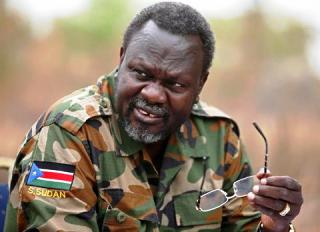Machar says differences with Kiir not a power struggle
April 5, 2014 (ADDIS ABABA) – South Sudan’s former vice-president, Riek Machar, who now leads a rebellion against the government of president Salva Kiir, said his differences with the latter were not about power struggle, explaining that the issues were fundamentally “doctrinal-type”.

Fighting erupted in mid-December between supporters of the two leaders in the presidential guards after heated political debates within the ruling Sudan People’s Liberation Movement (SPLM) which dwelt on the future leadership of the historical party that was supposed to chart the future of the country.
Machar criticised Kiir’s leadership style and declared his intention to democratically unseat him in what seemed to be an internal party move to wrestle power.
However, the rebel leader said the difference was not a power struggle or personal matter between him and the president.
“It is not a personal matter, nor a power struggle that divided us into what we are in. We ended up in a doctrinal-type fundamental difference,” he told the Turkish-based Anadolu Agency on Saturday.
“For me and us, the question is not who leads the country, but on the contrary, how do we lead our nation? This is what made me run up against solid-wall opposition from Salva Kiir,” he said.
He said the president had not prepared on defining issues for what would become the post-independent South Sudan.
He accused Kiir of “tragically hijacking” the whole nation, its wealth, the army and the ruling party (SPLM).
The rebel leader further stressed that the people of South Sudan were the owners of the land and its wealth, thus deserved constitutional order, the rule of law as well as free and fair elections.
However, in Kiir’s view, he added, was only to create a nation without defining issues for the country such as free elections, democracy and human rights.
Machar in the past also criticised Kiir for “dishonouring” their gentleman agreement in what would possibly become succession plan when he was the “running mate” for the president during the 2010 presidential elections.
He has time again called for the president to step down in order to find a solution to the conflict, warning that his group would use other means necessary to dispose South Sudan of the “dictatorship” unless Kiir peacefully negotiated end of his reign.
(ST)
